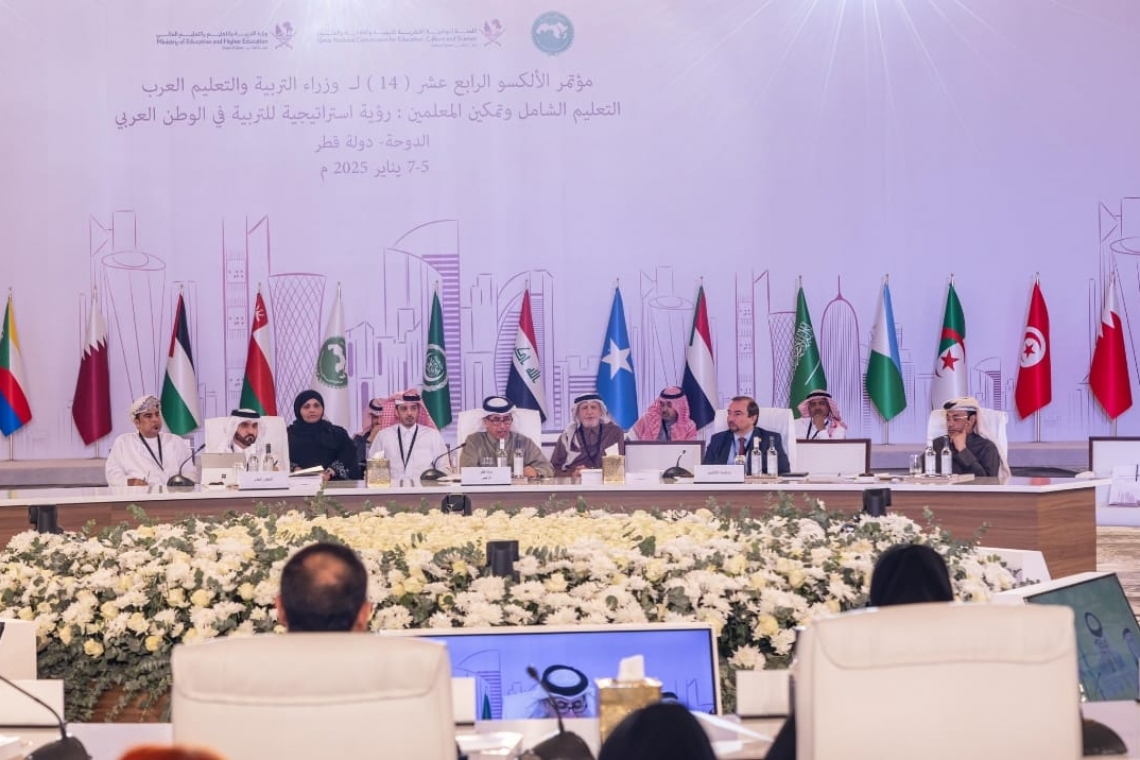Under the patronage of H.E. Dr. Mohamed Ould Amar, Director-General of ALECSO, and H.E. Mrs. Lolwah bint Rashid bin Mohammed Al Khater, Minister of Education and Higher Education of the State of Qatar, the 14th ALECSO Conference of Arab Education Ministers kicked off on January 5, 2025 in Doha, Qatar.
The Conference, held under the theme of “Inclusive Education and Teacher Empowerment: A Strategic Vision for Education in the Arab World,” is organized by ALECSO in partnership with the Ministry of Education and Higher Education and the Qatar National Commission for Education, Culture, and Science.
Addressing the Expert Meeting of the Conference, Dr. Rami Iskander, Director of Education at ALECSO, commended Qatar’s efforts in hosting this event, which reflects the country's commitment to education as a key tool for sustainable development, and its leadership in adopting initiatives designed to strengthen education as a fundamental right and a path toward socio-economic progress.
Dr. Iskander noted that the theme chosen for the Conference is a reflection of shared challenges and aspirations, and is aligned with the national strategies and plans adopted in the field of education. It also reflects ALECSO’s vision that places education at the heart of sustainable development efforts in the Arab region.
For his part, Dr. Ibrahim bin Saleh Al-Naimi, Undersecretary of the Ministry of Education and Higher Education, stressed that the Conference serves as a unique platform for educational leaders to share experiences, showcase successful practices, and learn about the latest developments in education. It also provides an opportunity to forge effective partnerships with countries and relevant regional and international organizations.
Dr. Al-Naimi pointed out that Qatar’s Third National Development Strategy (2024-2030) emphasizes the importance of providing a world-class educational system that guarantees equitable opportunities for all, thereby empowering learners to acquire the skills and competencies needed to enhance their capabilities, so that they can actively contribute to building their communities and ensuring a sustainable future based on the knowledge economy.
The Conference agenda includes an Expert Meeting on January 5 and 6, with the presentation of several documents, including:
- “Inclusive Education and Teacher Empowerment: A Strategic Vision for Education in the Arab World” (main document of the Conference)
- The Arab Model for Quality and Excellence in Education
- Qatar’s Document
- Technical Report of the High-level Steering Committee for Education
- Education Development Plan in the Arab World (2026-2035)
- Arab Reference Framework for Enhancing Technical Education
- “How to Achieve Educational Excellence” by the Hamdan bin Rashid Al Maktoum Foundation for Medical and Educational Sciences.
- “Training Package for Inclusive Education” by the Arab Educational Training Center for the Gulf States in partnership with the UNESCO Regional Office for the Gulf States and Yemen in Doha.
- National Experiences in Inclusive Education and Teacher Empowerment
- Common Arab Framework for Cooperation in Building Professional Capacities for Teachers and Supervisors in Digital Transformation.



